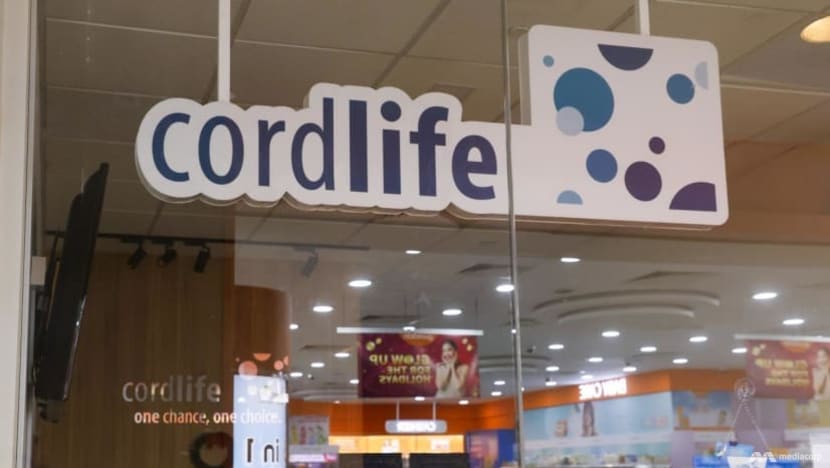'Paying for nothing': Parents affected by Cordlife mishandling unhappy with refunds offered
Cordlife customers who accept refunds have to agree that this is the “full and final settlement” of any claims against the cord blood banking company.

A Cordlife branch at Mount Elizabeth Novena Hospital on Dec 1, 2023. (Photo: TODAY/Ooi Boon Keong)

This audio is generated by an AI tool.
SINGAPORE: Parents who stored their child's cord blood with Cordlife have expressed frustration over the refunds offered by the beleaguered firm.
The cord blood banking company came under fire last November after it was revealed that seven of its 22 storage tanks were exposed to temperatures above the acceptable limit of -150 degrees Celsius.
About 2,200 cord blood units were damaged and the Ministry of Health (MOH) ordered further investigations into the other Cordlife tanks.
On Monday (Apr 8), the ministry said another 5,300 cord blood units have been deemed "non-viable". These had been stored in a tank and a dry shipper, which is intended for transport and not long-term storage.
After the latest MOH announcement, Cordlife informed affected parents that the cord blood units were damaged after "shortcomings in the way temperature checks were conducted, monitored, escalated", causing delays in replenishing liquid nitrogen to regulate tank temperatures.
“We are truly sorry that this has occurred, recognising that we have fallen far short of your expectations,” it said in emails seen by CNA.
Cordlife, a Singapore-listed firm and the longest-running private cord blood bank in the country, offered customers a refund of annual fees paid since "the start of temperature excursion". It also promised to waive subsequent fees until their child turns 21.
For some customers, the refund of annual fees would date back to 2019, but for others, it would be 2022. Cordlife said refunds from 2019 are for cord blood units stored in the dry shipper and those from 2022 were stored in the tank.
Refunds could take up to two months, it added.
"LACK FAIRNESS"
Cordlife customers CNA spoke to pointed out that they would not get back years of annual fees paid.
A father who stored his two children’s cord blood with the bank in 2006 and 2012 said his older child’s cord blood was among those damaged, while his younger child's was deemed to be at "low risk".
The 45-year-old business owner, who declined to be named, was offered a refund of the annual fees he paid since 2022. He has paid Cordlife a total of S$6,000 (US$4,460) for the collection and storage of his older child's cord blood, and pays an annual fee of about S$270 a year for each child.
“Cordlife's refund offer of one year's storage fee lacks fairness,” the father said.
He said that given the company's lack of transparency, he found it difficult to believe that his child's cord blood was only recently affected.
“I will not accept their refund offer … If my child's cord blood unit had been improperly stored for years, then at the minimum I should be refunded for those years as well, not just one year.”
Another parent was offered a refund of the annual fees she paid since 2019. The 41-year-old, who wanted to be known by her first name Debby, has been storing her only child’s cord blood with Cordlife since 2009.
Ms Debby, who works in the healthcare sector, has also been forking out S$270 a year for storage fees. A refund dating back to 2019 means she would not get back about 10 years’ worth of payments.
“That’s what I’m upset about. That means I’m paying for nothing. How can they just ... refund from 2019 until now? So what have we been paying for?”
Asked whether she would accept the refund, she said she is still "weighing her options". This includes taking legal action against Cordlife.
But she is unsure if suing the company would have any impact given that seven people in its management team have been arrested.
Former CEO Tan Poh Lan and four board members were arrested on Mar 22 over potential breaches of disclosure obligations. Five days later, the company said that chief financial officer Thet Hnin Yi had also been arrested.
Last Friday, a non-independent non-executive director on the board, Yiu Ming Yiu, was the seventh to be arrested.
FINAL SETTLEMENT CLAUSE
Customers who accept refunds are directed to an online form to fill in their personal information.
To get the refund, they have to acknowledge and agree to four clauses – including one that requires them to accept the offer as a "final settlement".
The clause reads: "I confirm that my acceptance of the waiver of storage fees is in full and final settlement of any claims that I or my child have or may have against CGL (Cordlife Group Limited), its directors and staff in relation to my child's cord blood unit."
A Cordlife spokesperson confirmed the clauses, saying that these were set out to explain the company's refund policy.
The clauses are also meant to assure customers of the company's commitment to find a suitable replacement cord blood unit if the need arises, the spokesperson added.
BILLS SUSPENDED FOR "LOW RISK" CUSTOMERS
In separate emails seen by CNA, Cordlife also informed customers whose cord blood units were classified as "low risk" that their bills would be suspended until additional tests were completed.
The Health Ministry said on Monday that five storage tanks that could have been affected were deemed low risk. These contain about 14,000 cord blood units.
Four of the five tanks likely had higher temperatures due to misplaced temperature probes or incorrect mapping of the temperature probe to the tank, it said. For the fifth tank, the duration of exposure might not have caused damage to the cord blood units.
More samples from these five tanks will be tested and their outcomes reviewed with the ministry's experts.
The email to customers said that additional tests, being done at a third-party laboratory, would take up to a year. Customers will be informed of the outcomes after the investigation is completed.




















